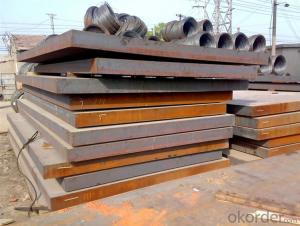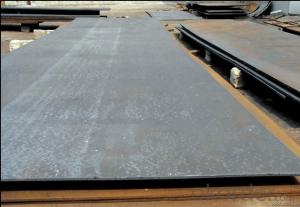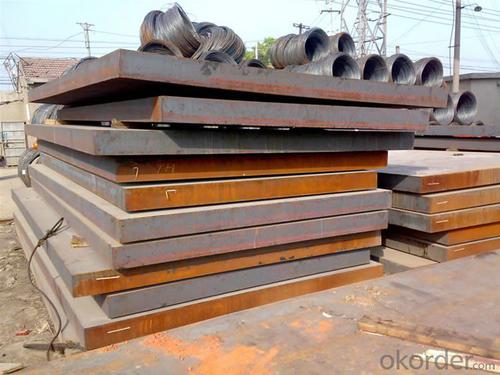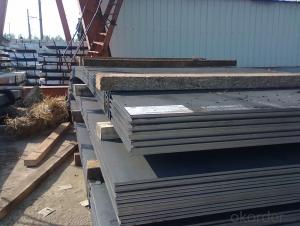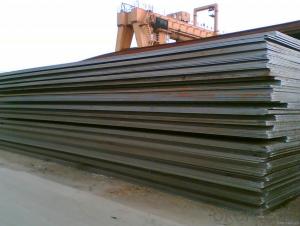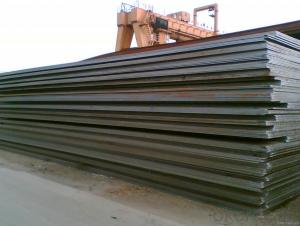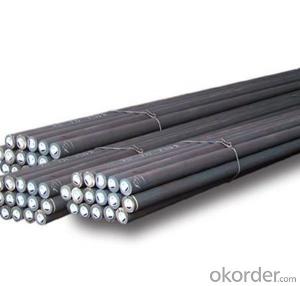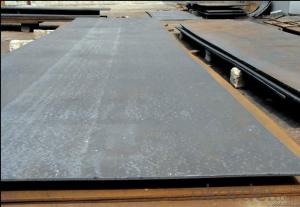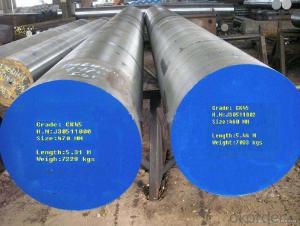Special Steel SKD11 Cold Working Die Steel Plate
- Loading Port:
- China main port
- Payment Terms:
- TT OR LC
- Min Order Qty:
- 25 m.t.
- Supply Capability:
- 10000 m.t./month
OKorder Service Pledge
OKorder Financial Service
You Might Also Like
Specification
The details of our Steel
1. Produce Standard: as the GB, AISI, ASTM, SAE, EN, BS, DIN, JIS Industry Standard
2. Produce processes: Smelt Iron -EAF smelt Billet - ESR smelt Billet -Hot rolled or forged get the steel round bar and plate
3. Heat treatment:
Normalized / Annealed / Quenched+Tempered
4. Quality assurance:
All order we can received Third party inspection, You can let SGS, BV,.. and others test company test and inspect our products before Goods shipping.
Product information
Chemical Composition(%)
Country | Standard | C | Si | Mn | Cr | Mo | V | S | P | Other |
China(GB) | Cr12Mo1V1 | 1.40-1.60 | ≤0.60 | ≤0.60 | 11.0-13.0 | 0.70-1.20 | ≤1.10 | ≤0.030 | ≤0.030 | Co≤1.00 |
USA(ASTM) | D2 | 1.40-1.60 | 0.30-0.50 | 0.30-0.50 | 11.0-13.0 | 0.70-1.20 | 0.8 | ≤0.025 | ≤0.025 | Co:0.60 |
Germany(DIN) | 1.2379 | 1.50-1.60 | 0.10-0.40 | 0.15-0.45 | 11.5-12.5 | 0.60-0.80 | 0.90-1.10 | ≤0.030 | ≤0.030 | - |
Japan(JIS) | SKD11 | 1.40-1.60 | ≤0.40 | ≤0.60 | 11.0-13.0 | 0.80-1.20 | 0.20-0.50 | - | - | Ni≤0.50 |
Available Size
Rolled flat steel | 12-90mm×205-610mm×L |
Forged flat steel | 100-300mm×400-600mm×L |
Applications: suitable for various complicated cold working dies with high precision and long lifetime,such as punching dies,cold extrusion dies,thread rolling dies,screw plates,cold extrusion dies,and precise measuring devices
Product show

Workshop show

- Q: What are the main factors affecting the cost of special steel?
- The main factors affecting the cost of special steel include the cost of raw materials, such as iron ore and other alloying elements, as well as energy costs for the production process. Additionally, market demand and supply dynamics, production capacity, labor costs, and transportation expenses also play a significant role in determining the cost of special steel.
- Q: What are the different surface coating methods used for special steel?
- There are several surface coating methods used for special steel, including electroplating, hot-dip galvanizing, powder coating, and PVD (Physical Vapor Deposition) coating. Each method provides unique properties such as corrosion resistance, improved aesthetics, and enhanced durability, depending on the specific requirements of the steel application.
- Q: How is special steel used in the aerospace manufacturing process?
- Special steel is used in the aerospace manufacturing process primarily for its strength, durability, and resistance to extreme temperature and pressure conditions. It is commonly employed in the construction of critical components such as turbine blades, landing gear, and structural parts of aircraft. The unique properties of special steel enable it to withstand the demanding environments and ensure the safety and reliability of aerospace systems.
- Q: What are the applications of special steel in the oil and gas manufacturing process?
- Special steel is widely used in the oil and gas manufacturing process for various applications. It is utilized in the construction of pipelines, offshore platforms, and equipment such as valves, pumps, and compressors. The high strength and corrosion resistance of special steel make it suitable for handling extreme conditions, such as high pressure and temperature environments, as well as corrosive substances like drilling fluids and sour gases. Additionally, special steel is employed in the fabrication of storage tanks and vessels, ensuring durability and preventing leakage or failure. Overall, the applications of special steel in the oil and gas industry contribute to enhanced safety, efficiency, and longevity of the manufacturing process.
- Q: What are the different types of corrosion-resistant steel?
- There are several types of corrosion-resistant steel, including stainless steel, weathering steel, and galvanized steel. Stainless steel is the most common type, known for its high resistance to corrosion due to the presence of chromium. Weathering steel forms a protective rust-like layer, providing long-term corrosion resistance. Galvanized steel is coated with a layer of zinc, which acts as a barrier against corrosion.
- Q: How does special steel contribute to the aerospace industry?
- Special steel contributes to the aerospace industry by offering several key benefits. Its high strength-to-weight ratio makes it ideal for constructing lightweight yet durable components, improving fuel efficiency and overall performance of aircraft. Additionally, its exceptional resistance to corrosion, heat, and extreme conditions ensures the longevity and reliability of aerospace structures. Special steel also enables the production of intricate and complex parts, enhancing the design flexibility and safety of aircraft.
- Q: How does precipitation hardening enhance the strength of special steel?
- Precipitation hardening is a heat treatment process that enhances the strength of special steel by creating small, uniformly dispersed particles within the metal matrix. These particles act as obstacles to dislocation movement, making it more difficult for them to slide past each other and deform the material. This results in increased strength, hardness, and resistance to wear and fatigue, making the steel suitable for various demanding applications.
- Q: Does special steel have any magnetic properties?
- Yes, special steel can have magnetic properties, depending on its composition and treatment. Steel is primarily composed of iron, and iron is a ferromagnetic material, meaning it can be magnetized. However, the presence of other elements such as nickel, cobalt, and certain alloys can affect the magnetic properties of steel. For instance, stainless steel, which contains chromium and nickel, is generally non-magnetic or only weakly magnetic. On the other hand, materials like tool steel or high-speed steel can exhibit stronger magnetic properties due to their composition and heat treatment. Therefore, it is important to consider the specific type of special steel and its alloying elements when determining its magnetic properties.
- Q: What are the different methods for joining special steel?
- There are several methods available for joining special steel, which is typically used in applications that require high strength, corrosion resistance, or specific mechanical properties. Some of the most common methods for joining special steel include: 1. Welding: This is the most common method used to join special steel. Different types of welding techniques can be employed, such as arc welding (including shielded metal arc welding, gas metal arc welding, and flux-cored arc welding), resistance welding (spot welding, seam welding), and laser welding. Welding requires the use of filler material to bond the steel pieces together, and it can produce strong and durable joints. 2. Brazing: Brazing involves joining special steel using a filler material (typically a brass or bronze alloy) with a lower melting point than the base steel. The filler material is heated until it melts and flows into the joint, creating a strong bond. Brazing is often used for joining dissimilar metals or when the base steel has a high melting point. 3. Soldering: Similar to brazing, soldering also involves using a filler material with a lower melting point to join special steel. However, soldering typically uses a non-ferrous filler material, such as tin-lead or tin-silver alloys. Soldering is commonly used for joining electronic components or delicate parts that cannot withstand high temperatures. 4. Mechanical Fastening: Special steel can also be joined using mechanical fasteners, such as bolts, screws, rivets, or clips. This method is often used when the joint needs to be easily disassembled, or when welding or brazing is not feasible or desirable. 5. Adhesive Bonding: Adhesive bonding involves using a specialized adhesive or glue to join special steel. This method is suitable for joining thin or delicate steel components or when the joint requires high resistance to vibration or shock. Adhesive bonding can provide a strong and durable bond, but it may not be suitable for high-temperature or high-stress applications. It is important to consider the specific requirements of the application, such as strength, corrosion resistance, temperature resistance, and the desired permanence of the joint, when selecting the appropriate method for joining special steel. Each method has its own advantages and limitations, and choosing the right method will ensure a strong and reliable joint.
- Q: How is special steel used in the production of cutting inserts?
- Special steel is used in the production of cutting inserts due to its unique properties, such as high hardness, wear resistance, and heat resistance. These qualities make it effective for withstanding the high temperatures and forces involved in cutting operations. Special steel cutting inserts are designed to cut through various materials, including metals, plastics, and composites, with precision and efficiency, making them essential tools in industries such as manufacturing, automotive, and aerospace.
Send your message to us
Special Steel SKD11 Cold Working Die Steel Plate
- Loading Port:
- China main port
- Payment Terms:
- TT OR LC
- Min Order Qty:
- 25 m.t.
- Supply Capability:
- 10000 m.t./month
OKorder Service Pledge
OKorder Financial Service
Similar products
Hot products
Hot Searches
Related keywords
